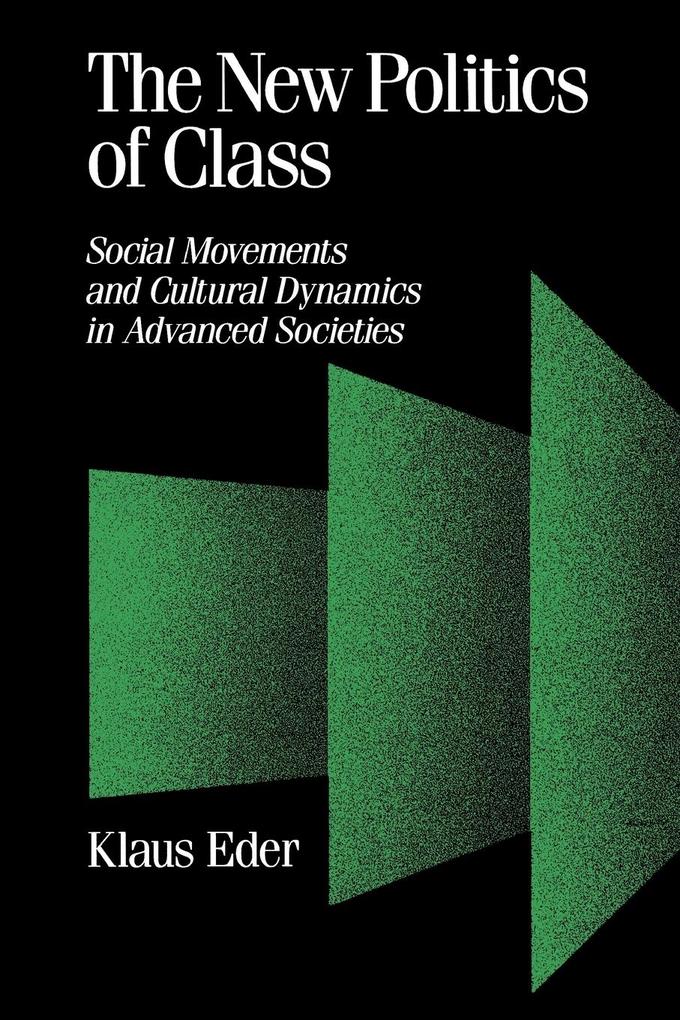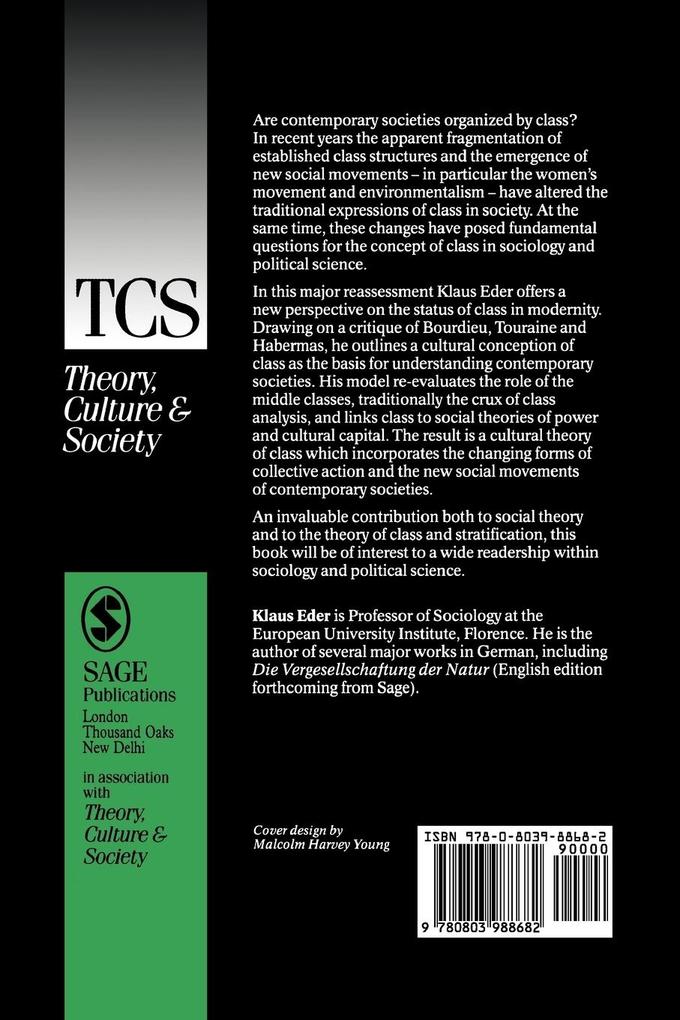
Zustellung: Do, 24.07. - Mo, 28.07.
Versand in 5 Tagen
VersandkostenfreiBestellen & in Filiale abholen:
Klaus Eder offers a new perspective on the status of class in modernity. He outlines a cultural conception of class as the basis for understanding contemporary societies. His model re-evaluates the role of the middle classes and links class to social theories of power and cultural capital.
Are contemporary societies organized by class? In recent years the apparent fragmentation of established class structures and the emergence of new social movements - in particular the women's movement and environmentalism - have altered the traditional expressions of class in society. At the same time, these changes have posed fundamental questions for the concept of class in sociology and political science.
In this major reassessment, Klaus Eder offers a new perspective on the status of class in modernity. Drawing on a critique of Bourdieu, Touraine and Habermas, he outlines a cultural conception of class as the basis for understanding contemporary societies. His model reevaluates the role of the middle classes, traditionally the crux of class analysis, and links class to social theories of power and cultural capital. The result is a cultural theory of class which incorporates the changing forms of collective action and the new social movements of contemporary societies.
Inhaltsverzeichnis
INTRODUCTION
CLASS AND SOCIAL MOVEMENTS
Bringing Classes Back into the Theory of Society
Culture as the Missing Link Between Class and Collective Action
PART ONE: MODERNIZING THE NOTION OF CLASS
Contradictions and Social Evolution
A Theory of the Role of Class in the Production of Modernity
Beyond Class as a Historical Subject
Towards a Theoretical Construction of Collective Actors
PART TWO: RECONNECTING CULTURE AND CLASS
Culture and Class
Bourdieüs Culturalist Refraction of the Traditional Theory of Class
The Cognitive Representations of Social Inequality
A Sociological Account of the Cultural Basis of Modern Class Society
PART THREE: THE THEORY OF NEW SOCIAL MOVEMENTS: A CHALLENGE TO CLASS THEORY?
A New Social Movement?
The Continuing Vitality of the Theory of the New Social Movements
Counterculture Movements against Modernity
Nature as a New Field of Class Struggle?
PART FOUR: NEW CLASS CONFLICTS? THE THEORY OF MIDDLE CLASS RADICALISM
The New Social Movements
Moral Crusades, Political Pressure Groups, or a Social Movement?
Does Social Class Matter in the Study of Social Movements?
A New Theory of Middle Class Radicalism
CONCLUSION: BEYOND TRADITIONAL CLASS THEORY
From the Crisis of Class Politics to the Critique of Class Politics
Reflecting the Role of Crisis Discourses in Modern Society
CLASS AND SOCIAL MOVEMENTS
Bringing Classes Back into the Theory of Society
Culture as the Missing Link Between Class and Collective Action
PART ONE: MODERNIZING THE NOTION OF CLASS
Contradictions and Social Evolution
A Theory of the Role of Class in the Production of Modernity
Beyond Class as a Historical Subject
Towards a Theoretical Construction of Collective Actors
PART TWO: RECONNECTING CULTURE AND CLASS
Culture and Class
Bourdieüs Culturalist Refraction of the Traditional Theory of Class
The Cognitive Representations of Social Inequality
A Sociological Account of the Cultural Basis of Modern Class Society
PART THREE: THE THEORY OF NEW SOCIAL MOVEMENTS: A CHALLENGE TO CLASS THEORY?
A New Social Movement?
The Continuing Vitality of the Theory of the New Social Movements
Counterculture Movements against Modernity
Nature as a New Field of Class Struggle?
PART FOUR: NEW CLASS CONFLICTS? THE THEORY OF MIDDLE CLASS RADICALISM
The New Social Movements
Moral Crusades, Political Pressure Groups, or a Social Movement?
Does Social Class Matter in the Study of Social Movements?
A New Theory of Middle Class Radicalism
CONCLUSION: BEYOND TRADITIONAL CLASS THEORY
From the Crisis of Class Politics to the Critique of Class Politics
Reflecting the Role of Crisis Discourses in Modern Society
Produktdetails
Erscheinungsdatum
01. Juni 1993
Sprache
englisch
Seitenanzahl
236
Autor/Autorin
Klaus Eder
Verlag/Hersteller
Produktart
kartoniert
Gewicht
365 g
Größe (L/B/H)
234/156/13 mm
ISBN
9780803988682
Entdecken Sie mehr
Pressestimmen
`Addresses important questions and has some interesting things to say about them. . . [the book] is a `sampler' of the work of a social theorist who is already influential in Germany. . . . Eder is clearly an astute and well-informed analyst' - Theory, Culture & Society
`Eder makes a significant contribution to the development of a theory of social movements which avoids the reductive tendencies of Marxism while at the same time allowing us to perceive the new social movements as more than free floating interest groups. . . Eder's essays are theoretically rigorous and innovative' - Political Studies
`Provides a good occasion to get to know this important German sociologist. . . . Eder's theorizing is very rich, full of provocative conceptual ideas and sound insights' - American Journal of Sociology
`Eder's work is systematic, rigorous and an important statement of the NSM (New Social Movements) approach' - Choice
Bewertungen
0 Bewertungen
Es wurden noch keine Bewertungen abgegeben. Schreiben Sie die erste Bewertung zu "The New Politics of Class" und helfen Sie damit anderen bei der Kaufentscheidung.










